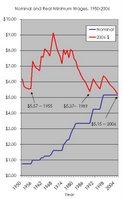Much has been said on both sides of this issue. One side says that the poor cannot live on $5.15 an hour. The other says that it will cause a loss of jobs and that those jobs are largely entry level, also that it will cause inflation. In reality, both have some truth to them. I thought I would add some sense of the economic to this issue.
 In real terms, the minimum wage has never been lower. That is, in purchasing power, when indexed for inflation at 2006 levels, the minimum wage is lower than it was in the late 1950's when it was a nominal rate of only $1/hr. This is illustrated by the accompanying chart (taken from Irregular Times)
In real terms, the minimum wage has never been lower. That is, in purchasing power, when indexed for inflation at 2006 levels, the minimum wage is lower than it was in the late 1950's when it was a nominal rate of only $1/hr. This is illustrated by the accompanying chart (taken from Irregular Times)Also, minimum wage workers are certainly not the majority and so the effects of raising the minimum would be lower due to this. The question is, just how much would that effect be? To look at that we need to determine how many people would be effected. Currently that number is about 7.3 million. Those workers are generally part time workers so I feel it is safe to work with an average 30 hour work week. That then puts those workers at making a combined total of approx $1.13 Billion a week. If we were then to add a 50% raise to those workers it would increase $564 million a week, or a total of $29.3 Billion a year. **
Now to put this in comparison we need to take note of the largest cause of inflation. The Federal Reserve. The Fed (NOT a part of the Federal Government) creates excess money at a varying rate on a weekly basis, but rarely is that number anywhere less that $10 Billion. Last week, as reported by the Mogambo Guru, "Total Fed Credit exploded by another $6.8 billion, another $8 billion of actual cash was released... Enough money was created to allow Total Commercial Paper to jump by $23.7 billion! All in one week!"
So in one week, nearly the entire inflationary effect of a years worth of raise for the minimum wage worker was created by the Fed. What this tells me is that the entire economic downside to an increase in the federal minimum wage could be offset by simply stopping the Fed from increasing the money supply for two weeks, three weeks tops.
** I realize that raising the wage for the minimum wage worker would also sweep up others who are slightly above the minimum and so the numbers would need to be reworked but I simply do not have the numbers or the time available to quantify that. If anyone has more info on that please let me know as I would gladly take a further look at this issue.